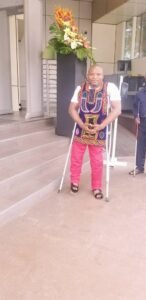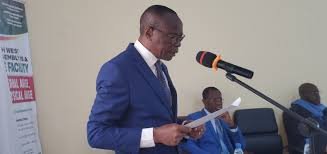Cameroon’s two Anglophone regions have been locked in a deadly armed conflict for nine years, and persons with disabilities (PWDs) are among the most affected. Instead of leading efforts to fill the cracks left by the conflict and rekindle hope within this community, the Governor of the Northwest Region has downplayed its effects on PWDs.
The administrator, Adolphe Lele Lafrique, who should be at the forefront of inclusive humanitarian intervention schemes to assist this population, is believed to have done the opposite.
“We want to thank CDENO for continuing to give support not only to the victims of the crisis in the North West Region, but extending their assistance to the persons living with disabilities… that is quite interesting,” remarked the governor. While the statement might have been interpreted by many as a fair political comment, to PWDs it was far more than that. Most left the event venue unhappy and disappointed.
To them, the Governor, who is the highest authority in the region, should know firsthand the toll the raging Anglophone Conflict is having on persons with disabilities. Instead, while speaking during an event in Bamenda organised by the Northwest Livestock Development Fund (CDENO) to support victims of the conflict, he implied that PWDs were benefiting from the actual victims.
Chicks and other items were given to selected persons to enable them survive the economic hardship brought about by the conflict. It is not clear if any needs assessment was done to ensure meaningful inclusion of PWDs, but many left unhappy following the Governor’s statement. Efforts to get the administrator to provide clarity on his comment have yet to yield results.
For the few persons with disabilities fortunate to benefit from CDENO’s outreach, discontent was immediate. “We face a lot of difficulties especially during this crisis,” revealed a beneficiary with mobility impairment to Global Promotion Media.
For many PWDs, being alive is nothing short of a miracle. If not from stray bullets or targeted killings during military raids and separatist attacks, then hunger and isolation have contributed to the deaths of dozens in the Anglophone regions. Following Governor Lele’s insinuation that PWDs are not affected by the conflict, leaders of Organisations of Persons With Disabilities (OPDs) have been highlighting its devastating impact on the community.

One of those addressing the issue is Sunday Ghali Bekwa, President of the Special Needs Entrepreneur Group, an organisation of PWDs in Bamenda, the capital of the Northwest Region. In an exclusive interview with DNA, he said that due to the conflict, most of his peers who were once breadwinners are now beggars, living at the mercy of goodwill donations like those from the CDENO event, where most left with more questions than answers.
PWDs are among those most affected by the conflict, and to disability advocates, no sector has been spared. “If we suffered almost daily before the conflict, what about now that our children cannot go to school, we have no food to eat, and humanitarian schemes are largely designed for the non-disabled?” asked Ghali, his eyes heavy with tears. The Governor’s remarks, he said, only amplify the systemic neglect of PWDs during the conflict, adding insult to injury.
Although PWDs have always struggled to survive thanks to their craft, Ghali regrets that the conflict has further limited their socioeconomic integration. “Most of us are weavers, shoemakers and menders, embroiderers and bead makers. We mostly establish at the roadside because we cannot afford to pay for government stores which are very expensive,” he said, his head lowered in agony.
Due to the ongoing conflict, however hardworking PWDs may be, their efforts are often not enough to put food on their tables. “Most of us have already given into despair because of hardship and insecurity,” Ghali noted, adding that roadside trading during the crisis is a gamble which has resulted in many PWD deaths and other harrowing experiences.
The story of a mobility-impaired woman obliged to spend the night in the open due to shooting between government soldiers and separatist fighters in Bamenda is not one that Ghali and his peers will forget soon. The victim, a vegetable vendor at the Bamenda food market, had gone out hoping to raise some money from the day’s sales to sustain herself. Little did she know there would be danger. Even less did she expect that everyone would abandon her to the mercy of cold.
“I don’t know how she managed to sleep in the open space, but that is what happened due to serious shooting in town that day. Everyone struggled to save themselves, abandoning her where she sat at the entrance of the market,” Ghali recalled, his voice wrapped in pain and compassion.
DNA has also documented other challenges brought by the conflict on PWDs, including kidnapping, torture, invasion of rehabilitation centres and looting.
Since the conflict began in 2016, the government has yet to provide assistance specifically targeting persons with disabilities, despite repeated calls for urgent inclusive humanitarian intervention from human rights bodies.
The Governor’s recent statement, appearing to dismiss the horrendous effects of the conflict on PWDs, has exposed the extent to which the concerns of this minority group are ignored by their own government. If there is any expectation from PWDs after the administrator’s remarks, it is that the Governor must apologise in both word and action.
Nine years into the conflict, persons with disabilities need access to basic services such as food, shelter, healthcare, employment and potable water. They want their dignity restored, and for this to happen, both government soldiers and separatist fighters must respect their rights.
